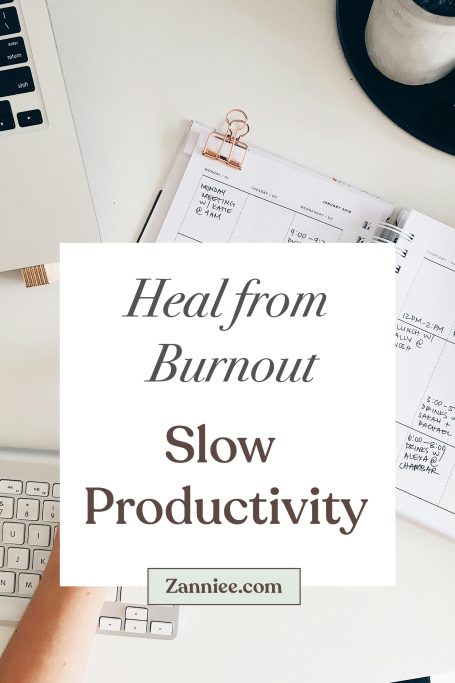Heal from Burnout Part 2: Slow Productivity
My personal sabbatical had to end at some point. With the start of the new year, I was ready to work more, but I couldn't return to my old routine since it caused my burnout. Still, I needed to get stuff done, so I researched ways to be productive while avoiding burnout, and I kept getting referred to Cal Newport's ideas on Slow Productivity and Deep Work.
Cal Newport is a professor and bestselling non-fiction author. He traced the pushback against hustle culture to predate the Coronavirus, around 2019, when Jenny Odell published How to Do Nothing: Resisting the Attention Economy. I read the book in 2021 and it resonated with me, as it did with many readers. While this and similar books pinpoint the problem, the solution is not so clear other than "be okay with doing less." Ironically, after the success of the book, the author is busier than ever. What if we can't do less or have goals to do meaningful work that requires lots of time and energy?
That's where Newport comes in. He says that as human beings, we like to do things. Doing nothing for long periods of time makes us feel uncomfortable and even rootless. He researched what productivity might have looked like for our paleolithic ancestors, and our best guess is that they did skilled and important work such as food acquisition and child-rearing at a natural pace with plenty of breaks. Even during a hunt, they got to rest or nap. They worked with up and down intensity but never took on too many things at once.
Contrast this to the present day, where we are bombarded with tasks big and small, at the workplace and at home, demanded by different people through various mediums. This massive, seemingly never-ending to-do list is what Newport calls Chronic Overload. We are not wired to handle this relentless pace of work.
Slow Productivity is the answer to realign with our ancient wiring. Its three main ideas are to:
- Do Fewer Things
- Work at a Natural Pace
- Obsess Over Quality

Whenever possible, say no to taking on more work until current projects are complete. Resist the urge to multi-task since switching tasks can slow your productivity by as much as 40%.
I realized what stressed me out in the past was working on too many projects at the same time and feeling as if it would take forever to complete all of them. I'd cram as many tasks into a day as possible, then felt I wasn't doing enough when I couldn't finish all of them.
Recently, I started "closing tabs." What happens when you have too many windows open on your computer or too many apps open on your phone? It slows down the system. Now I make sure to complete a project before I can move on to the next.
Newport also has this concept of Deep Work. Since our brains can only handle about 3 to 4 hours of focused work per day, we need to protect that time. That means cutting off distractions to focus: silencing the phone, resisting checking emails and social media, etc. Work during a time when you are most productive. For most people, that's usually the morning.
Use that Deep Work time to do the most important thing on your list. How do you choose the most important thing? It's what you would feel good about accomplishing that day even if you don't complete anything else. It's the most urgent thing that's tied to your goals, especially long-term goals. You want to do the most important things the most often.
The other stuff you can figure out how to spread out. Newport calls this Shallow Work, the work that takes less brain power, the low-level or mindless tasks such as answering emails and administrative duties. Deep work is not draining because it puts you in an enjoyable flow state, while shallow work is actually what's draining.
Try to keep the same times every day so you can make it a habit. Let's say you focus best from 9 am to noon. Block off that time on your calendar. Protect that time. Work at a natural pace and rhythm. Take breaks. Aim for 15-minute breaks every 90 minutes, preferably tech-free breaks.
Proper planning is great, but keep flexible because life happens. If you get interrupted during your work time, reschedule it for another time.
Don't conflate being busy with productivity. Busywork gives us the illusion we are getting more work done when we're not. If you're uncomfortable with having more downtime, stay in that discomfort until you get used to it. If you're someone who is really not used to resting, block out that time on your agenda or put it as a to-do task to check off so it feels like an accomplishment.
As a self-employed person, I have to regulate my schedule so I don't overwork. I try to stick to 9-5 office hours, and I make sure to take weekends off. Again, life happens and if I have to make up for work on the weekends, I'll make that the exception, not the rule. I have a planned schedule, but I also allow flow into my workweek to create the best environment for me.
When I have a long to-do list, I spread it out over the month so I'm not doing more than two major things per day. (I do best with just one.) This helps me focus on producing quality work. It was weird at first seeing just a couple of tasks on my agenda every day, but it gave me room to breathe. When I look at the results, I'm still accomplishing what I need at a good pace, and I'm not stressed doing so.
Update: I've been working this way for over a month, and I am getting a lot done. My burnout is gone and I'm excited about work again. I will say that I definitely need to protect my Deep Work time in the morning because when I do, I can finish the important work as early as 10 am! Then I am free to do the fun things, such as working on this blog. But it takes discipline not to get distracted by busywork, such as checking emails and social media, Googling unrelated and random questions that pop into my head, and doing minor tasks. On the days when I procrastinate, my Deep Work suffers. Protect your Deep Work time!
Do you have any advice for slow productivity? Let us know in the comments below.
